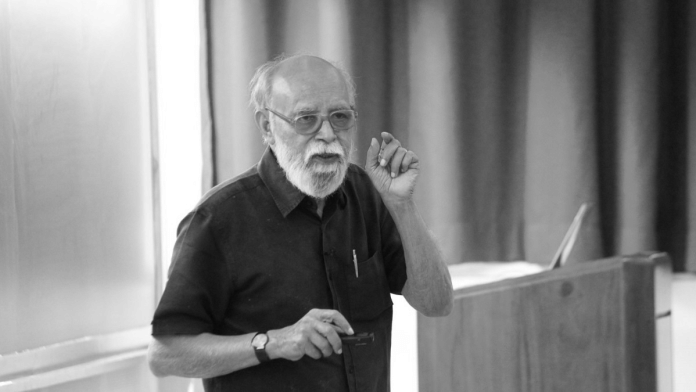Bengaluru: Professor P.P.Divakaran, the renowned historian of mathematics who died Saturday in Cochin, was a man with the perfect blend of academic rigour and a flair for history. He was 89.
“He was an authority everybody sort of looked up to. A person who actually had the domain knowledge, and he was able to shed the correct light on the historical part,” Kaushal Verma, Dean, Physical & Mathematical Sciences Division, Indian Institute of Science (IISc), told ThePrint.
Former principal scientific advisor to the government of India, K.VijayRaghavan, posted on X that, “we have lost a scholar of ancient Indian mathematics, a physicist, a gregarious colleague and a friend to many across science and mathematics.”
To many, Divakaran was a man with utmost respect for facts as opposed to agenda driven narrative on the history of mathematics in India. “His work was extremely scholarly, that was credible and therefore mathematicians took the work seriously,” said Mohan Rajendran, mathematics faculty at Azim Premji University.
Divakaran’s phenomenal contribution to the field was the scholarly text, ‘The Mathematics of India: Concepts, Methods, Connections,’ in which he drew examples from India to show the contributions in mathematics from India.
In a personal interaction with Divakaran, who was also a theoretical physicist, Rajendran had once told him that his book was “too dense”. To Rajendran’s surprise, Divakaran considered the criticism without reluctance. “He was humble and grounded. He treated a younger colleague equally,” Rajendran recalled.
His extensive focus was on Kerala School of Mathematics, which included Madhava of Sangamagrama, an ancient Indian mathematician and astronomer and his contribution to the domain of calculus even before German polymath Gottfried Wilhelm Leibniz and English polymath Isaac Newton.
Naresh Dadhich, former director of Pune’s Inter-University Center for Astronomy and Astrophysics, remembers Divakaran as a “charming,” person and a diligent researcher. Divarakaran, according to Dadhich, wanted to visit the archives in Rome to find out any relationship between the mathematics originated in India and its overseas exchanges.
Also Read: Karnataka is set for next generation leap, India’s first quantum summit kicks off in Bengaluru
The forgotten authentic past
As a physicist at Tata Institute of Fundamental Research, Mumbai, Divakaran had his second innings as a historian when he retired from TIFR in 1996. “What Divakaran did was he tried to portray what really was done as opposed to what some people like to paint (in history of Indian mathematics),” said Ramesh Sreekantan at Indian Statistical Institute, Bengaluru Centre, who was a long time friend of Divakaran. According to Sreekantan, Divakaran busted the “misplaced pride in the past.”
Divakaran, although with his strong opinions, approached history with a neutral approach and always wanted to “stick to the facts which is what many of the people don’t necessarily do,” Sreekantan added.
“What he has shared with his friends in numerous conversations is that India had a great intellectual tradition,” said Babu Joseph, former vice-chancellor of Cochin University of Science and Technology (Cusat), and a friend of Divakaran.
To most Europeans, India is a place where only philosophies are rooted. Divakaran wrote chapters with caution, to emphasize the fact that the country had its own rich tradition of mathematics based on proofs not just intuitions.
“He would be talking mostly about the history of mathematics,” Joseph added.
Nonetheless, towards the later part of his life, Divakaran returned to physics. This work involved a long pursuit of finding relationships between fundamental constants of physics like the gravitational constant, speed of light, Planck’s constant and so on. The unfinished work still exists as a draft where in 2024 Divakaran wrote, “Einstein’s hypothesis of the ‘the constancy of the speed of light,’ redundant.”
As his close friends say, Divakaran’s remarkable insights into the history of Indian mathematics will remain a treasured legacy.
(Edited by Tony Rai)
Also Read: What’s stopping India from building its AI models? Experts list a host of challenges







Dear Mallu author,
It was nice to read about Prof. Dinakaran
There’s no mention of his iconic book and the publication.
To attract readers, resorting to words like Sheva driven etc is cringe. Not mentioning other prolific mathematicians who have brought about a change like Prof Ramasubramanian, is shameful.
His primary focus was on the history of mathematics in India, particularly the Kerala School of Mathematics from the 15th and 16th centuries.
He dedicated significant research to the work of the mathematician-astronomer Madhava of Sangamagrama and his contributions to calculus, which predated the work of Isaac Newton and Gottfried Wilhelm Leibniz.